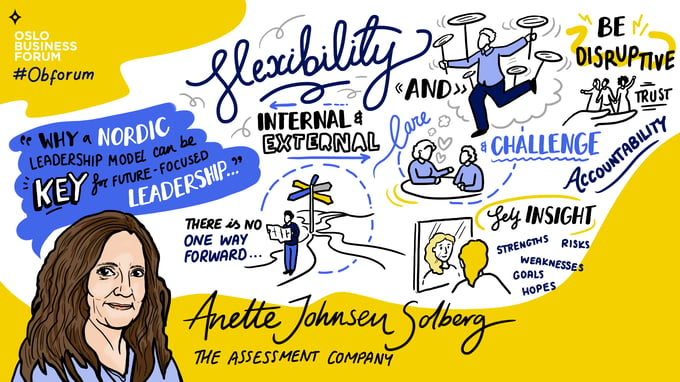Annette Johnsen Solberg is Head of Academy at The Assessment Company, a consultancy that helps leaders in people selection and development. She and The Assessment Company team work to transform change into organizational design by detecting capability gaps and designing solutions to fill them.
At Oslo Business Forum, Annette shared research from The Assessment Company that focused on future-focused leadership, the Nordic way.
The most studied and least understood
Leadership is possibly the most studied yet least understood phenomenon in the world. And, unfortunately, the complexity in the current business environment hasn’t created any greater clarity.
As leaders, the paradoxes that we face challenge us every day. Many leaders find that they must be many things at once and fear that they lack the capabilities to navigate today’s complexities. In an effort to learn more about the most critical capabilities for effective leadership, The Assessment Company partnered with researchers to dig deep into literature and science for answers.
As they embarked on their study, the researchers recognized that leadership is a cultural experience. They narrowed their focus to the Nordic countries to examine how these leaders work today and how they must think about the future. As she reviewed the findings, Annette offered leaders at Oslo Business Forum insights and inspiration for their own development.
.jpg?width=680&height=453&name=Kopi%20av%20MaxEmanuelson_OsloBusinessForum_MAX00069%20(1).jpg)
A model for flexible leadership
Traditionally, many leaders fall into the trap of either-or thinking. They often think of themselves as having to be “this” or “that” when in fact, they need to balance many different traits and skills.
“What we realized in this study was the importance of one word,” said Annette. “This was the word ‘and.’”
The lesson that arose from this insight is that the most important capability of future-focused leaders is flexibility.
In response to this finding, The Assessment Company developed a model that defines flexible leadership on three levels and identifies the paradoxes present in each.
Strategic Flexibility. When leaders are strategically flexible, they are unafraid to inspire change and guide their teams through complexity. But they must also pay attention not to run too fast. At the same time, leaders must be externally-focused and aware of the challenges outside of their organizations. Equally, they must focus internally to ensure their people are aligned and equipped to navigate those challenges.
The paradoxes of strategic flexibility: Leaders must be disruptive and conservative. Leaders must focus externally and internally.
Relational Flexibility. When leaders are relationally flexible, they want to be seen as caring and supportive. But to ensure their team members’ growth and development, they must also challenge them to reach further. Another essential component of future-focused leadership is the ability to foster trust. But too much trust can lead to a lack of clarity, so you must also hold people accountable.
The paradoxes of relational flexibility: Leaders must be caring and challenging. Leaders must foster trust and accountability.
"You cannot challenge without caring."
Personal Flexibility. A personally flexible leader is driven and has a strong desire for performance. But pushing ourselves—or our teams—too hard is not sustainable and can lead to burnout. A focus on well-being is necessary to guard against this. Flexible leaders are also confident but must guard against overconfidence by reflecting on their opportunities.
The paradoxes of personal flexibility: Leaders must be high-performing and focused on well-being. Leaders must be confident and self-examining.
.jpg?width=680&height=453&name=Kopi%20av%20MaxEmanuelson_OsloBusinessForum_MAX00044%20(1).jpg)
Self-insight is at the core
“The core is about self-insight,” said Annette. “Maybe you should think about and instead of either-or. There may be something there you can use to develop your organization.”
The ways in which leaders might apply The Assessment Company’s model will depend upon their leadership level. Annette describes the framework as systemized knowledge about paradoxes in the leadership role that help create more clarity about the future of leadership in the Nordic context.
Annette left leaders with two insights to help them prepare for a more complex future.
- Engage in self-insight. Look out for your blind spots, have a learning mindset, and dare to try a different approach.
- Embrace flexibility. As you broaden your capabilities, be flexible to adjust to the situations that arise.
Key Points
- Observation, foundation, and communication are three elements that are crucial to good decision-making.
- Observation allows leaders to gain insight and perspective from internal and external sources.
- Foundation allows leaders to build and earn trust, creating a structure for a common vision and aligned goals.
- Communication allows leaders to create greater clarity and transparency.
Questions to Consider
- How often do you “look out the window” to seek insights and inspiration from outside your organization?
- How diverse is your organization, and is there a feeling that people can speak up?
- What have you done to create a common vision and align goals and objectives across your team? With the broader organization?
- Are you crisp in your communication to facilitate faster and easier decision-making?
- Are you transparent in sharing challenges and opportunities to engage your team in decision-making?

Want to be a part of the OBF community? Join Oslo Business Forum 2023: Thriving in Chaos now!.png?width=680&name=CTA_2023%20(2).png)